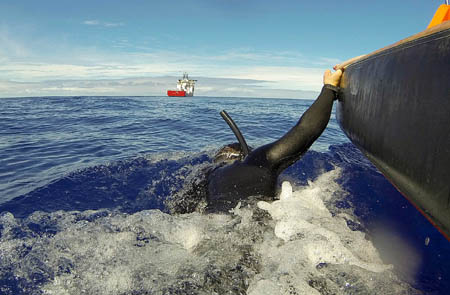 Perth, Apr 13: Searchers hunting for the missing Malaysian plane in the Indian Ocean today failed to find any confirmed clues about the black boxes of the aircraft, as no new signals have been detected over the past 48 hours.
Perth, Apr 13: Searchers hunting for the missing Malaysian plane in the Indian Ocean today failed to find any confirmed clues about the black boxes of the aircraft, as no new signals have been detected over the past 48 hours.
"Up to 11 military aircraft, one civil aircraft and 14 ships will assist in today's search," the Joint Agency Coordination Centre (JACC) said in a statement, adding the centre of the search areas was set approximately 2,200 km north west of Perth.
It said the Australian Maritime Safety Authority had planned a visual search area, totalling 57,506 sq km compared to 41,393 sq km yesterday.
No new signals have been detected over the past 48 hours, as the search for the missing jet entered into 37th day. The last of the four other signals was detected on Tuesday night.
In an effort to narrow the underwater search area in which the autonomous underwater vehicle is deployed, JACC said the Australian defence vessel, Ocean Shield, continued more focused sweeps with the towed pinger locator to try and locate further signals related to the black box.
Last Wednesday, JACC chief coordinator Angus Houston said the autonomous underwater vehicle would be deployed once signals could no longer be detected.
Finding black the black box is crucial to know what happened on March 8 before the Beijing-bound Malaysia Airlines jet with 239 people, including five Indians, an Indo-Canadian and 154 Chinese nationals, mysteriously vanished after taking off from Kuala Lumpur.
The batteries powering the black box are certified to be working for 30 days, but can still provide weak signals for some more days. Stored in a plane's tail, they are designed to begin sending off distinct, high-pitched signals as soon as they come in contact with water.
China's vessels have been searching in an area of about 25,000 square kilometers, which is in the western part of the search region designated by the Australian authorities, said Zhuo Li, an official with the China Maritime Search and Rescue Center.
In the eastern region of about 15,000 square kilometers, vessels from other countries, including Australia, the UK, the US and Malaysia, have been in search, Zhuo added.
By midday today, the center had mobilized 63 merchant ships for assistance in the search, covering about 167,135 square kilometers in total, he said.
The mystery of the missing plane continued to baffle aviation and security authorities who have so far not succeeded in tracking the aircraft despite deploying hi-tech radar and other gadgets even after searching for 37 days.
Australian Prime Minister Tony Abbott yesterday said signals possibly from the black box of the ill-fated Malaysian jet were "rapidly fading" and the ongoing massive search for the plane was likely to continue "for a long time".





Comments
Add new comment